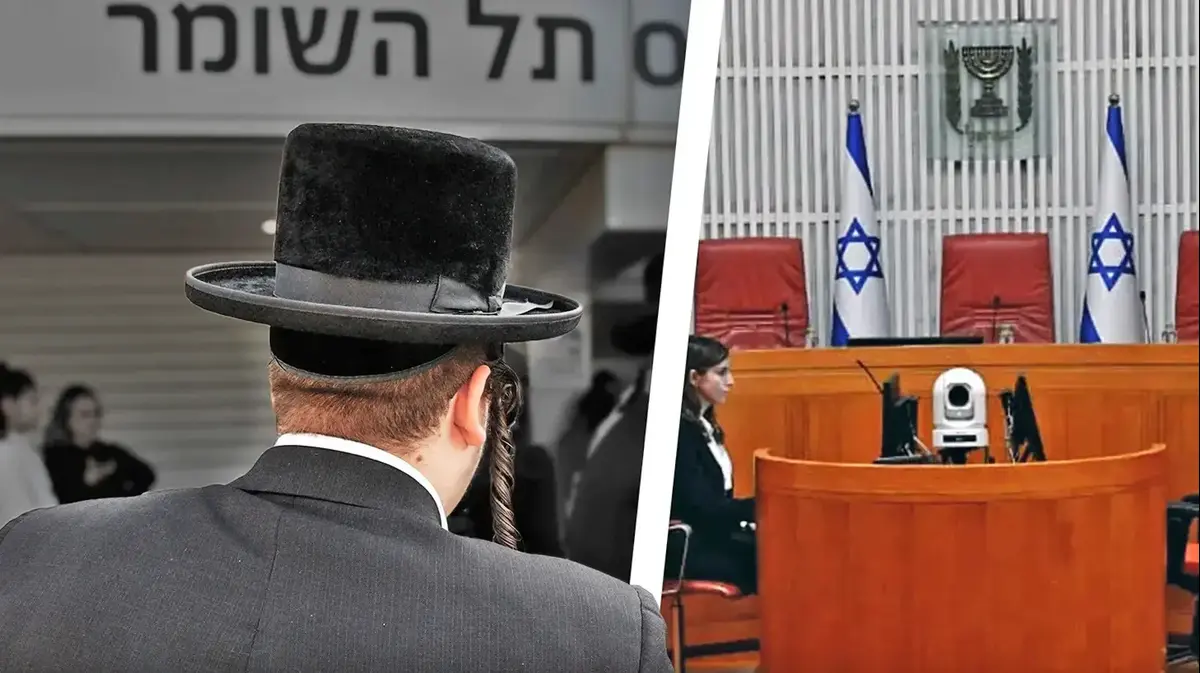news
News in Israel
Criminal news and law
The future of rotation and the alternate prime minister: what should be known about the petitions against the Netanyahu-Gantz government
The High Court judges discussed the request to invalidate the amendment to the Basic Law that led to the establishment of the replacement government.
Tags
High Court
The Likud
Blue and white
Bnei Gantz
government
Petitions
Esther Hayut
Daniel Dolev
Tuesday, 27 October 2020, 20:57
Share on Facebook
Share on WhatsApp
Share on general
Share on general
Share on Twitter
Share on Email
0 comments
Development of the vaccine for the corona virus, with first photographs ...
Cabinet approves peace agreement with UAE ...
Italy: Corona demonstrations expand, clashes with police ...
Auditor's Report on the Corona Crisis: GSS Technology Fails, ...
Gamzo: As of today, free tests without a referral from a doctor ...
USA: Presidential candidates Biden and Trump meet for confrontation ...
Police have located about 100 dogs suspected of having a serious illness ...
Auditor's Report on the Corona Crisis: For More Than 135,000 Children ...
The auditor's report on the corona crisis found: An array of investigations ...
A 9-year-old man who was riding his bicycle was killed by a truck in Ashkelon ...
In the video: The High Court hears petitions against the government structure (Photo: GPO)
The Supreme Court today (Tuesday) discussed long hours in petitions that sought to invalidate the amendment to the Basic Law of Government, which led to the establishment of the Likud and Blue and White exchange government and the creation of the role of the replacement prime minister.
Although the hearing was broadcast live to make it accessible to the general public, it still required an understanding of quite a few legal terms.
More on Walla!
NEWS
The High Court unanimously rejected the petitions against the formation of the government by Netanyahu and the coalition agreement
To the full article
More on Walla!
NEWS
Petitioners judge against Netanyahu: "The legislature did not find it appropriate to order incompetence"
Netanyahu to the High Court: "I will not deal with senior appointments related to the law enforcement system"
The perfect time to get ready for next summer: the gel that raises the stretch marks
The High Court hearing on the petitions against the exchange government, today (Photo: Yonatan Zindel, Flash 90)
What do the petitioners actually ask of the High Court?
The formation of the unity government between Blue and White and the Likud was made possible mainly through an amendment to the Basic Law of the Government, which regulates what an "exchange government" is, the balance of power between the various components of government, and defines a position that did not exist until then.
Petitioners - the Movement for Quality of Government, the Meretz faction, Adv. Avigdor Feldman and the "New Contract" and "Israel Democracy Guard" associations, asked the court to invalidate the amendment.
What are the allegations made against the law?
The first argument
raised in the petitions is that the amendment to the Basic Law should be invalidated because it is unconstitutional.
To understand this claim, and also its problematic nature, one must know that the reasoning by which the High Court rules ordinary laws is that they are in conflict with the Basic Laws, which are in a higher status - the status of a constitution.
What is the basis, then, for disqualifying Basic Laws? A Basic Law can also contradict the "super-principles" of democracy or the system of government, at a level that would justify its rejection. One can think, for example, of a Basic Law that will stipulate that no more elections will be held in Israel. The
doctrine of "unconstitutional constitutional amendment" has not been adopted. By the Supreme Court in Israel, and as a result has never been implemented, but various petitioners have been pushing for its adoption, and even more so in recent months.This time again it was argued that the amendment that allowed the formation of the current rotation government, although made in Basic Law, is unconstitutional.
It is argued that the amendment to the Basic Law of Government is unconstitutional.
Petitioners' representatives at the High Court hearing (Photo: Yonatan Zindel, Flash 90)
A second argument
that has been at the center of the debate is that the government has abused the power to enact basic laws.
Although the Basic Laws are supposed to constitute chapters in the future constitution of the State of Israel, and therefore deal with issues that are "world-class" such as the nature of the state or human rights, their legislative process is no different from that of ordinary law.
In practice, any majority of Knesset members can pass any law they wish, giving it the title "Basic Law", thus vaccinating it from the disqualification of the High Court.
In the present case it has been argued that the amendment of the Basic Law of Government to create the blue-white-Likud exchange government is a real regime change, made solely to solve a temporary and occasional political problem of inability to form a government.
A third argument
, which is in the middle between the last two claims, is that amending the Basic Law and changing the structure of the government can not be done after the election, and regarding the elections that have already taken place, because voters went to the polls knowing that after the election there will be one prime minister. Alternate government.
What does the other side claim?
The respondents to the petitions are the Knesset, the government, the Likud and Blue and White.
The Likud first argued, as a threshold claim, that the issue is not fair and that the court is not authorized to discuss the constitutionality of the Basic Law.
The Knesset, for example, chose not to express an opinion on the question of "unconstitutional constitutional amendment," and like the ombudsman replied that even if such a doctrine was adopted, the current amendment would certainly not be one of those rare and exceptional cases that would shake the regime's basic principles. law.
According to respondents, this is a total possibility of adding a rotation government, alongside the possibility of establishing a regular government. another contention of the respondents is that once elected Knesset - she has all the powers of the Committee, including the power to amend the basic law.
What will happen if the High Court decides to accept the petitions?
First, the chances of receiving the petitions are very small, if only because the vast majority of constitutional petitions have been rejected.
Moreover, his claim was heard that Supreme Court President Esther Hayut believed that there was a considerable chance of receiving the petitions - she would have ordered the hearing before an extended panel of judges, and would not have left it in a regular panel of three judges.
This is despite the fact that this is the most senior panel of the Supreme Court in terms of seniority: President Hayut, Deputy Hanan Meltzer and Justice Neil Handel.
If the petition is accepted anyway, it will be an unprecedented case, so one can only guess the possible consequences.
Judges will be able to, for example, in the most extreme (and least reasonable) possibility, announce that the entire amendment is void immediately.
It is not clear then what the status of Prime Minister Benjamin Netanyahu and the replacement Prime Minister Bnei Gantz will be, and it can be assumed that such a ruling will put Israel in regime chaos.
President Hayut and Lt. Meltzer at the hearing of the petition, today (Photo: Jonathan Zindel, Flash 90)
Another option could be to repeal some of the sections of the amendment to the law immediately, so that the Likud and Blue and White can fill in the gaps by other means, such as amending the coalition agreement. A proposal in this spirit was raised during the hearing by Adv. Avigdor Feldman.
In any case, it is not inconceivable that any intervention by the High Court in the content of the amendment will lead to the disintegration of the government and the election. But in any case, as stated, the possibility that seems more reasonable is that the High Court will dismiss the petitions.
Share on Facebook
Share on WhatsApp
Share on general
Share on general
Share on Twitter
Share on Email
0 comments









